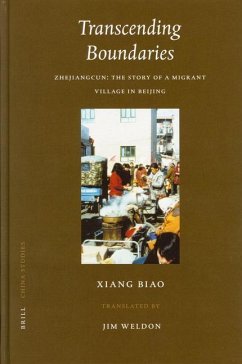This book sheds new light on state-society relations in contemporary China by demonstrating how rigid official boundaries internal to the state system, which were essential for the state's control over society, have paradoxically facilitated the growth of new social spaces. Based on long years of fieldwork, the book takes us to a highly unlikely site in Beijing "Zhejiangcun (literally 'Zhejiang village'), the biggest migrant community in China, located only five kilometres south of Tian'anmen Square -- where 100,000 migrants, mostly from Wenzhou, have organised a vibrant garment industry despite regular state crackdowns. It documents the spontaneous evolution of Zhejiangcun into a hub of nationwide migrant business networks transcending officially imposed boundaries. The book also makes use of Chinese folk insights and philosophical traditions as analytical tools for tackling fluid social relationships unconfined to physical space.
Bitte wählen Sie Ihr Anliegen aus.
Rechnungen
Retourenschein anfordern
Bestellstatus
Storno

